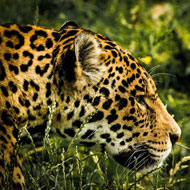Growing illicit trade in jaguar fangs

The market for jaguars could be increasing due to a crackdown on the smuggling of tiger parts used in traditional Chinese medicine.
Conservationists are warning that the recent discovery of a dead jaguar with its fangs missing in Belize, followed by a headless ocelot in the same canal, point towards a growing illicit trade in jaguar parts.
The environment ministry of Belize is offering a $5,000 (£3,600) reward for information on the jaguars killed there. Both animals were found in a drainage canal, on the 26 December 2017 and 10 January 2018 respectively. It is thought the ocelot may have been mistaken for a young jaguar.
A report in the journal Nature suggests wildlife trafficking often follows Chinese construction projects in other countries, as Chinese workers can send or take items home.
Jaguar fangs, skulls and hides have long been trophies for Latin American collectors, but it is thought a trafficking route has emerged to China in recent years. The market for jaguars could be increasing due to a crackdown on the smuggling of tiger parts used in traditional Chinese medicine.
Trade in Bolivia
Eight packages containing a total of 186 jaguar fangs were confiscated in Bolivia between August 2014 and February 2015, before they made it to China. Seven of these packages were sent by Chinese citizens living in Bolivia. Another eight were reportedly intercepted in 2016, while 120 fangs were seized in China, according to Bolivian biologist Angela Núñez.
Radio advertisements and flyers in northern Bolivia - where several Chinese companies are working - offer $120-150 (£86-108) per fang, which is more than a month’s income for local people.
However, very few cases of wildlife trafficking result in prosecution. According to the article in Nature, two Chinese men have been arrested for trading in jaguar parts. One received a three-year suspended sentence after being detained in 2014, while the other, who was arrested in 2016, is awaiting sentencing but Bolivian officials believe he may have left the country.
Esteban Payán, from global wild cat conservation group Panthera, fears the cases in Bolivia are ‘the tip of the iceberg’, as anecdotal reports suggest trafficking is occurring in other countries too.
Threats to the species
Deforestation has cut the jaguar’s habitat in half, depleting its prey and forcing it into contact with people and livestock. After habitat loss, the biggest threat to the species is retaliatory killings by farmers that have lost cows or calves to predators. These killings may also provide a sporadic supply of animal parts to the wildlife trade.
Measures to help prevent the killings could include electric fences to prevent jaguars crossing over from forests to pastures, putting bell on cows, flashing lights around pastures, sheds for calves and guard animals to protect herds. Biologist Ricardo Moreno also suggests governments could provide farmers with financial incentives to ensure better livestock management.
Estimates suggest the remaining jaguar population could be anywhere from 60,000 animals to nearly three times that figure.



 HMRC has invited feedback to its communications regarding the employment status of locum vets and vet nurses.
HMRC has invited feedback to its communications regarding the employment status of locum vets and vet nurses.